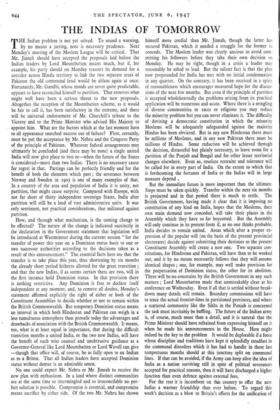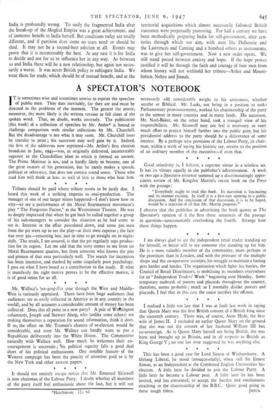THE INDIAS OF TOMORROW T HE Indian problem is not yet
solved. To sound a warning, by no means a jarring, note is necessary prudence. Next Monday's meeting of the Moslem League will be critical. That Mr. Jinnah should have accepted the proposals laid before the Indian leaders by Lord Mountbatten means much, but if, for example, his party should on Monday reassert its demand for a corridor across Hindu territory to link the two separate areas of Pakistan the old communal feud would be ablaze again at once. Fortunately, Mr. Gandhi, whose moods are never quite predictable, appears to have reconciled himself to partition. That removes what might well have been a serious threat to the new proposals.. Altogether the reception of the Mountbatten scheme, as it would be fair to call it, has been satisfactory in the extreme, and there will be universal endorsement of Mr. Churchill's tribute to the Viceroy and to the Prime Minister who advised His Majesty to appoint him. What are the factors which at the last moment have to all appearance snatched success out of failure? First, certainly, must be put the acceptance by Mr. Nehru and the Congress Party of the principle of Pakistan. Whatever federal arrangements may ultimately be concluded (and there may be none) a single united India will now give place to two or—when the future of the States is considered—more than two Indias. There is no necessary cause for regret in that. Partings can be perfectly friendly and for the benefit of both the elements which part ; the severance between Norway and Sweden in 1905 is one of many examples of that. In a country of the area and population of India it is unity, not partition, that might cause surprise. Compared with Europe, with not far short of thirty independent sovereign States, India after partition will still be a land of vast administrative units. It was only sentiment, not practical considerations, that militated against partition.
How, and through what mechanism, is the coming change to be effected? The nature of the change is indicated succinctly in the declaration in the Government statement that legislation will be introduced at Westmins, ter during the current session "for the transfer of power this year on a Dominion status basis to one or two successor authorities according to the decisions taken as a result of this announcement." The essential facts here are that the transfer is to take place this year, thus shortening by six months the already short period hitherto allotted for the great transition ; and that the new Indias, if as seems certain there are two, will in the first instance hold Dominion status. In that provision there is nothing restrictive. Any Dominion is free to declare itself independent at any moment, and, to remove all doubts, Monday's statement affirmed explicitly the right of either or both of the Constituent Assemblies to decide whether or not to remain within the British Commonwealth. But temporary Dominion status means an interval in which both Hindostan and Pakistan can weigh in a less tumultuous atmosphere than prevails today the advantages and drawbacks of association with the British Commonwealth. It means, too, what is at least equal in importance, that during the difficult transition months a united India, or the two new Indias, will have the benefit of such wise counsel and unobtrusive guidance as a Governor-General like Lord Mountbatten or Lord Wavell can give —thpugh that office will, of course, be as fully open to an Indian as to a Briton. That all Indian leaders have accepted Dominion status without demur is an admirable omen.
No one could expect Mr. Nehru or Mr. Jinnah to receive the new plan with enthusiasm. hi a land where distinct communities are at the same time so intermingled and so irreconcilable no per- fect solution is possible. Compromise is essential, and compromise means sacrifice by either side. Of the two Mr. Nehru has shown himself more cordial than Mr. Jinnah, though the latter has secured Pakistan, which it needed a struggle for the former to concede. The Moslem leader was clearly anxious to avoid com- mitting his followers before they take their own decision on Monday. He may be right, though in a crisis a leader may reasonably be asked to lead. But the salient fact is that the plan now propounded for India has met with no initial condemnation in any quarter. On the contrary, it has been received in a spirit of reasonableness which encourages measured hope for the discus- sions of the next few months. But even if the principle of partition is accepted wholeheartedly the problems arising from its practical application will be numerous and acute. Where there is a mingling of diverse communities or races or religions you may reduce the minority problem but you can never eliminate it. The difficulty of devising a democratic constitution in which the minority Moslems will be adequately safeguarded against the majority Hindus has been obviated. But in any new Hindostan there must be millions of Moslems, and in any new Pakistan there must be millions of Hindus. Some reduction will be achieved through the decision, distasteful but plainly necessary, to leave room for a partition of the Punjab and Bengal and for other lesser territorial changes elsewhere. Even so, resolute restraint and tolerance will be called for in every part of India. On the extent to which that is forthcoming the fortunes of India or the Indias will in large measure depend .
But the immediate future is more important than the ultimate. Steps must be taken quickly. Transfer within the next six months is projected and in that period there is much to settle. The British Government, having made it clear that it is imposing no constitution of any kind on India, hopes that the Moslems, their own main demand now conceded, will take their places in the Assembly which they have so far boycotted: But the Assembly will only continue in its present form if, as no one thinks probable, India decides to remain united. Areas which after a proper ex- pression of the popular will (on the basis of the present provincial electorates) decide against submitting their destinies to the present Constituent Assembly will create a new one. Two separate con- stitutions, for Hindostan and Pakistan, will have then to be worked out, and it by no means necessarily follows that they will assume identical shapes ; one, for example, may well make provision for the perpetuation of Dominion status, the other for its abolition. There will be no constraint by. the British Government in any such matters ; Lord Mountbatten made that unmistakably clear at his conference on Wednesday. Even if all that is settled without break- down many details will remain. Boundary commissions will have to trace the actual frontier-lines in partitioned provinces, and where a scattered community like the Sikhs in the Punjab is concerned the task must inevitably be baffling. The future of the Indian army is, of course, much more than a detail, and it is natural that the Prime Minister should have refrained from expressing himself on it when he made his announcements in the House. Here might indeed be the key to the problem It would be deplorable if a force• whose discipline and traditions have kept it splendidly steadfast in the communal disorders which it has had to handle in these .last tempestuous months should at this juncture split on communal lines. If that can be avoided, if the Army can keep alive the idea of India as a nation surviving still in spite of political severances accepted for practical reasons, then it will have discharged a higher function than even defence against external foes. - For the rest it is incumbent on this country to offer the new Indias a warmer friendship than ever before. To regard this week's decision as a blow to Britain's efforts for the unification of India is profoundly wrong. To unify the fragmented India after the break-up of the Moghul Empire was a great achievement, and of immense benefit to India herself. But conditions today are totally different, and if partition dces come no tears need or should be shed. It may not be a second-best solution at all. Events may prove that it is incontestably the best. At any rate it is for India to decide and not for us to influence her in any way. As between us and India there will be a new relationship, but again not neces- sarily a worse. It was never British policy to subjugate India. We went there for trade, which should be of mutual benefit, and at the territorial acquisitions which almost necessarily followed British statesmen were perpetually protesting. For half a century we have been methodically preparing India for self-government, after cen- turies through which our aim, with men like Dalhousie and the Lawrences and Canning and a hundred others as instruments, was to give her self-government. Now a new order opens. We still stand poised between anxiety and hope. If the hope proves justified it will be through the faith and courage of four men from whom history will not withhold her tribute—Attlee and Mount- batten, Nehru and Jinnah.



































 Previous page
Previous page